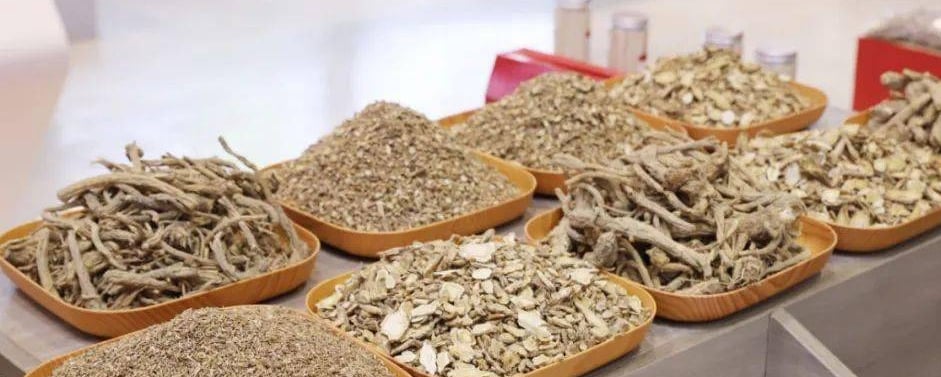The Role of Taizishen (Radix Pseudostellariae) in the Formulation of Digestive-Strengthening Medicines
Gastrointestinal health is a central pillar of traditional and modern medicine, determining how efficiently the human body absorbs nutrients and maintains vitality. Disorders such as indigestion, anorexia, abdominal distension, and poor appetite are increasingly common due to irregular diets and modern stress. In the field of Traditional Chinese Medicine (TCM), one of the most recognized and effective herbs for improving digestive function and strengthening the spleen and stomach is Taizishen — also known as Radix Pseudostellariae, Pseudostellaria Root, Prince Ginseng Root, or Heterophylly False Starwort Root.
10/18/20253 min read
This paper discusses the pharmacological characteristics, biochemical composition, and clinical applications of Taizishen in the formulation of Jianwei Xiaoshi (digestive-strengthening) medicines, highlighting its synergy with other herbs and its evidence-based therapeutic value.
Botanical and Pharmacognostic Profile of Taizishen
Botanical source: Pseudostellaria heterophylla (Miq.) Pax.
Family: Caryophyllaceae
Common names: Taizishen (Chinese), Radix Pseudostellariae (Latin), Prince Ginseng Root (English), Heterophylly False Starwort Root (scientific translation).
Taizishen is a perennial herb native to China, primarily cultivated in Fujian, Anhui, and Guizhou provinces. Morphologically, the root resembles ginseng but is smaller and lighter in color. This resemblance is the reason behind its popular name “Prince Ginseng,” signifying its milder yet similar tonic properties to Panax ginseng.
Phytochemical Composition
Modern phytochemical analyses reveal that Radix Pseudostellariae contains a variety of bioactive compounds, including:
Polysaccharides: The major active constituents responsible for immune regulation and gastrointestinal protection.
Saponins: With mild adaptogenic and anti-inflammatory effects.
Amino acids and trace elements: Contributing to metabolism and tissue repair.
Flavonoids: Acting as antioxidants to protect gastric mucosa from oxidative damage.
These compounds make Pseudostellaria Root an ideal ingredient for formulations targeting digestive weakness, appetite loss, and post-illness fatigue.
Pharmacological Mechanisms Related to Digestive Health
Regulation of Spleen and Stomach Qi
According to traditional Chinese medical theory, the spleen governs transformation and transportation, while the stomach governs reception and digestion. When spleen Qi is weak, food stagnation, bloating, and poor appetite occur.
Taizishen, being sweet and neutral in nature, tonifies the spleen Qi without producing internal heat or dryness. This makes it suitable for individuals with weak constitution, especially children or elderly patients who are prone to indigestion due to Qi deficiency.
Regulation of Gut Microbiota
Recent pharmacological data indicate that Taizishen modulates the gut microbiome by increasing beneficial bacteria such as Lactobacillus and Bifidobacterium while suppressing harmful flora. This contributes to improved digestion, reduced bloating, and better immune regulation — aligning with its traditional function of harmonizing spleen and stomach.
Enhancement of Gastric Secretion and Motility
Pharmacological studies have demonstrated that extracts of Radix Pseudostellariae can increase gastric juice secretion and enhance intestinal peristalsis, thereby facilitating digestion and nutrient absorption. Its polysaccharides stimulate the release of digestive enzymes such as pepsin and amylase, improving breakdown of carbohydrates and proteins.
Application in Digestive-Strengthening Formulations
Taizishen as a Core Ingredient
In digestive-strengthening formulations like Jianwei Xiaoshi granules or tablets, Taizishen serves as a mild tonic and harmonizing agent. Unlike strong tonics such as ginseng, it nourishes Qi without overstimulation, making it safer for children and patients with weak digestion.
Typical formula applications combine Taizishen with herbs such as:
Hawthorn (Shanzha): Promotes food digestion, especially of meats and fats.
Malt (Maiya): Regulates starch digestion and relieves food stagnation.
Poria (Fuling): Strengthens spleen and eliminates dampness.
Atractylodes (Baizhu): Enhances spleen Qi and prevents diarrhea.
In such formulations, Taizishen acts as the Qi-nourishing and harmonizing nucleus, ensuring that the digestive-improving herbs function without exhausting the patient’s vital energy.
Synergistic and Safety Considerations
Compatibility and Synergy
Taizishen demonstrates excellent compatibility with both warming and cooling herbs. When combined with Atractylodes macrocephala or Codonopsis pilosula, it enhances spleen-tonifying effects; when paired with Hawthorn or Malt, it strengthens digestion and food transformation.
This synergy allows Radix Pseudostellariae to serve as a bridge between tonification and elimination therapies — a concept central to TCM balance.
Safety Profile
Toxicological evaluations confirm that Prince Ginseng Root is non-toxic and well-tolerated. Its gentle pharmacological action makes it particularly suited for children, elderly individuals, and convalescents. Unlike Panax ginseng, which may cause heat or restlessness in sensitive patients, Taizishen is mild and balanced, reinforcing its reputation as the “gentle ginseng.”
Modern Pharmaceutical Development
Standardization and Extraction
Modern pharmaceutical technology has advanced the standardization of Pseudostellaria Root through controlled cultivation and extraction techniques. High-performance liquid chromatography (HPLC) ensures consistent polysaccharide content, while modern granulation processes preserve active compounds for better solubility and absorption.
Integration with Functional Foods
Beyond traditional medicine, Taizishen has found applications in functional digestive foods and nutraceutical beverages. Its mild sweetness and adaptogenic nature make it a suitable additive in digestive teas, health snacks, and post-meal tonics aimed at maintaining gastrointestinal comfort.
Taizishen’s pharmacodynamic profile aligns perfectly with the needs of digestive-strengthening (Jianwei Xiaoshi) therapy — tonifying Qi, improving digestive enzyme secretion, protecting gastric mucosa, and regulating microbiota. Unlike strong purgatives or purely enzyme-promoting agents, Taizishen addresses the root cause of indigestion: spleen deficiency and Qi weakness.
Furthermore, as modern lifestyles continue to challenge digestive systems with irregular meals and high-fat diets, Taizishen-based formulations offer a natural, gentle, and evidence-backed solution for restoring gastrointestinal balance.
Protection of Gastric Mucosa
Chronic indigestion and gastric discomfort are often linked to damage of the gastric mucosal lining. The antioxidant flavonoids and polysaccharides in Heterophylly False Starwort Root exhibit cytoprotective effects against ethanol- and stress-induced gastric injury. Experimental evidence shows that Taizishen reduces inflammatory cytokine levels and enhances mucin production, forming a protective barrier in the gastrointestinal tract.


Clinical Efficacy in Functional Dyspepsia
Clinical observations show that Taizishen-based formulations effectively improve symptoms of functional dyspepsia, chronic gastritis, and pediatric indigestion. In a double-blind controlled trial involving children with poor appetite, the group receiving Taizishen-containing granules showed significant improvement in food intake, abdominal comfort, and weight gain compared to placebo.
These effects are attributed to its dual function of enhancing digestion while nourishing Qi, a combination rarely achieved by synthetic drugs.
Our Services
Provide high quality Pseudostellaria baicalensis, welcome to cooperate.
Contact Us
E-Mail:info@pseudostellaria.com
© 2025. All rights reserved.
Add:Shibing Township, Kaili City, Guizhou Province, China
